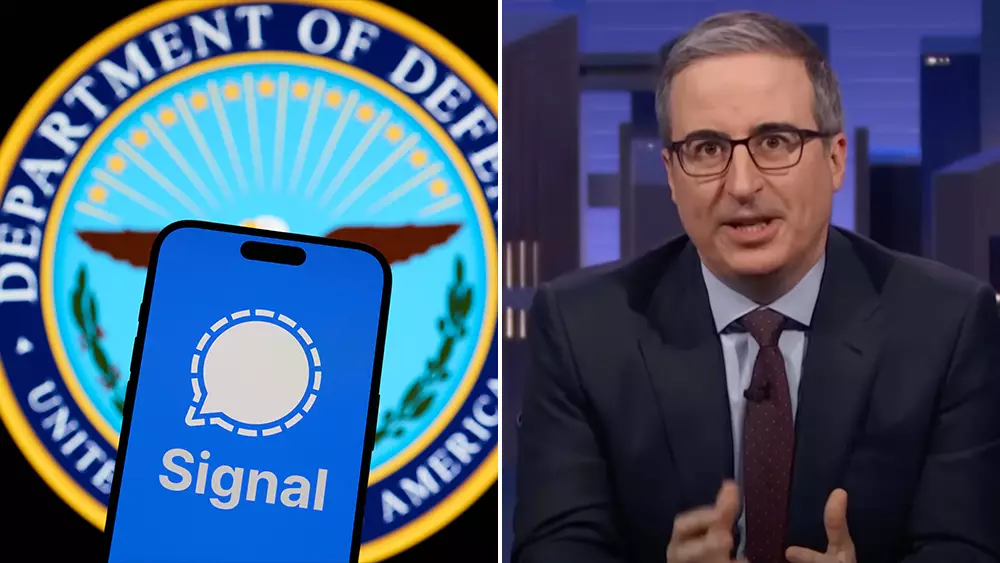In an era dominated by reckless governance, one can scarcely avoid the insipid absurdities emanating from the political arena. Recently, John Oliver, known for his unapologetic critiques, launched a scathing indictment of the previous Trump administration’s grotesque shortcomings, particularly illustrated by the ludicrous Signal group chat leak. The report from The Atlantic, which cheekily bore the title, “The Trump Administration Accidentally Texted Me Its War Plans,” not only exposed incompetence at alarming levels but also embodied the very essence of political triviality that has plagued contemporary discourse.
Oliver’s incisive wit took aim at the administration’s apparent inability to treat vital matters with the gravitas they deserve. He likened the use of emojis in a context that should have demanded solemnity—a chat titled “Houthi PC Small Group” featuring the likes of National Security Adviser Michael Waltz—to cheerily waving a flag at a funeral. This portrayal reflects a broader tendency within the administration to prioritize quirkiness over the seriousness required in diplomacy and security affairs. It poses a critical question: how did we arrive at a point where emoji usage during discussions about military action becomes a hallmark of governance?
The Telling Emotions Behind Unsafe Practices
The ridiculousness doesn’t halt at the superficial level; it steadily branches into the profound implications of misguided policies. Oliver highlighted the mass deportations of Venezuelan migrants as a particularly alarming instance of governance gone wrong, noting the feeble evidence underpinning these deportations—sometimes as flimsy as mere tattoos. It’s a chilling reminder of how human lives are sacrificed on the altar of political posturing, often bereft of any form of empathy or due process.
The consequences of such actions are grave. Legal frameworks and human rights become secondary when an administration opts for sensationalism over substantive policy-making. The fast track for deportation, devoid of careful consideration, not only places individuals in precarious situations but also reveals the administration’s troubling pattern of equating humanity with criminality based on stereotypes.
The Dehumanization of Governance and Its Visual Narratives
Further exacerbating the narrative of cruelty is the imagery that the administration chose to convey its message. Oliver’s comments on Homeland Security Secretary Kristi Noem’s video, which featured a backdrop of caged prisoners, serve as a potent critique not just of policy, but of the visual politics that accompany it. The choice of using caged prisoners evokes chilling historical references and showcases a blatant disregard for the dignity of individuals. It’s a stark reminder of how the visual narrative can not only distort reality but also reinforce systems of dehumanization.
When the visuals of governance echo the historical injustices of the past, one must question the judgment of those in power. Are they not just conveying policy? Are they not also shaping societal perceptions about worth, dignity, and justice in a manner that echoes less of compassionate governance and more of a disconcerting spectacle?
The Disputed Landscape of Accountability
The pushback against the administration’s policies has surged, showcasing the resilience of public dissent. The outrage surrounding the deportations glimmers with hope, yet one must reckon with the damage already inflicted. Achieving accountability in the realm of governance remains a Sisyphean task, as repeated times of chaos overshadow the strides made toward justice. The calls for change are persistent, yet the very essence of the governance enacted sends a disheartening reminder that shortsighted, cruelty-laden policies prove challenging to undo.
As Oliver aptly pointed out, the administration’s penchant for indifference, shadowed by the occasional Nazi-adjacent visuals, reveals not only a grave miscalculation of leadership but also a disservice to the very fabric of democratic ideals. In our pursuit of an accountable government, we must remain vigilant against the banalities that cloud judgment. The road forward demands not only reflection and resistance but also a fundamental shift in how we address the needs and dignity of every individual, far beyond the trivialities of emojis and visual spectacles.
In a world that should prioritize serious governance, the persistence of absurdity is disheartening, yet it also fuels the fire for change. What remains at stake is not just our political sanity but the very foundation of a just society.


Leave a Reply